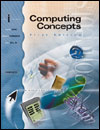As more businesses integrate their technology with the Internet,
there’s a greater chance that hackers or crackers will
compromise their systems. Remember, hackers are very
knowledgeable computer users who use their knowledge to invade
other people’s computers. Crackers are hackers
who hack for profit. No matter what a hacker or cracker’s intention, a company
wants to keep them out. If it can’t keep them out, then it
wants to find out how they got in and make sure it doesn’t
happen again. Sometimes the best way to guard against hackers and
crackers is to learn more about them. "White hat" hackers are
security professionals who show companies how to improve system
security: Many services exist to help companies keep their systems secure.
Some services monitor the Internet to see when company systems are
compromised. These services then report what type of system and
software was broken into and provide a software fix or explain how
to solve the problem. Businesses depend on these services to keep
their systems running. Usually, a business either has someone on
staff to keep systems current or pays a company to keep their
systems current. - Incidents.org: This Web
site tracks and reports security incidents.
- SANS Institute: The Systems
Administration, Networking and Security Institute is a key security
organization for tracking security incidents. They also train and
certify security professionals (GIAC
Certification).
- SecurityFocus: A
respected security tracking consulting company. Also provides daily
information on security incidents.
- SecurityTracker: This
Web site posts current system security incidents.
- @Stake: One of the
premier consulting companies. @Stake helps business increase
security. @Stake employs white hat hackers to compromise business
systems and then help businesses fix those systems.
-
Security Information Resources: A comprehensive list of
security resources.
Security tracking is also important to government and
educational institutions. The information available in these
systems can be even more sensitive than those found on business
systems. The U.S. government has an entire division as well as many
special units in Federal Agencies devoted to track security
incidents and fight cybercrime. Many states have departments as
well. Universities are responding by training more students in the
necessary skills and knowledge to become information security
professionals. - ACM SIGSAC: The
Alliance for Computing Machinery’s Special Interest Group on
Security, Audit, and Control.
- CERT Coordination Center:
The Computer Emergency Response Team at Carnegie Mellon University.
This center is primarily funded by the Department of Defense.
- Tracking
a Hacker: An essay by a United States District Attorney on how
the USDA office tracks security breaches.
- CyberCrime Unit: This
is a special unit of the Computer Crime and Intellectual Property
Section of the U.S. Government.
| 



 2002 McGraw-Hill Higher Education
2002 McGraw-Hill Higher Education